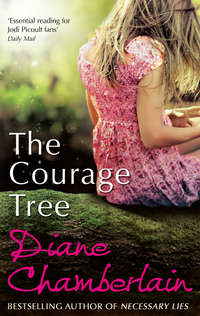
Полная версия
Her Mother's Shadow
She waved as he turned the car around and drove back onto the gravel lane. Slipping off her sandals, she dangled them over her fingertips and started walking across the sand toward the house. The air was thick with salt, and the rhythmic pounding of the waves against the shore was nearly drowned out by the buzz of cicadas.
She often wondered if she should tell Tom the truth about her mother. It was clear that he thought he had been her only affair, as if he alone had been so irresistible that he could cause a woman as saintly as Annie O’Neill to stray. As far as Lacey knew, he did not date anyone, still so haunted by Annie’s ghost that he thought it impossible to find a woman who could take her place. Yet Lacey couldn’t bring herself to hurt him with the truth.
Inside the house, Clay’s black lab, Sasha, ran into the kitchen to greet her, and she dropped her sandals on the floor and bent down to scratch the dog behind his ears. The room smelled of Gina’s cooking—cardamom and turmeric, coconut and ginger. She could hear voices coming from the living room.
“Who’s here, Sash?” she said, as if she didn’t know. “Let’s go see.”
Sasha led the way through the kitchen to the living room, tail wagging, and Lacey stopped in the doorway of the room, not wanting to interrupt the scene in front of her. Gina was stretched out on the sofa, grinning, her arms folded behind her head as she watched Clay and Alec playing on the floor with Rani and her dolls. Clay was making the Indian Barbie, which was bedecked in a pink sari, walk across the rug toward the plastic dollhouse.
“Let’s go to Rani’s house!” he said in a high-pitched voice.
Alec was walking a brown-skinned baby doll—a big blob of a doll compared to the slender, shapely Barbie—around on the carpet. “No,” he said. “I want to go fishing!”
Rani looked alarmed, reaching for the baby doll. “No, no, no!” she said, her enormous black eyes wide in her caramel-colored face. “Everyone comes to my house.”
Lacey laughed. At nearly two and a half, Rani tried hard to control her world. She’d had so little opportunity to control it during her first two years that she was making up for lost time. The little girl looked up at the sound of Lacey’s laughter, then jumped up from the floor.
“Lacey!” she said, running toward her. “I love you!”
Lacey bent down to pick her up. She was a little peanut of a child. So tiny. So full of joy. And so, so wanted.
“Hi, baby,” Lacey said. “I love you, too.”
Gina had struggled to adopt Rani, and once Clay had fallen in love with Gina, he had joined that struggle with his whole heart. They’d spent from July to September in India the year before, fighting the system to get the court’s permission to adopt Rani. The little girl had desperately needed heart surgery, but so many obstacles stood in the way of the adoption that Gina had feared the toddler might die before she could bring her home. Once permission had been received, the three of them were quickly ushered out of the country, escaping before the foreign adoption antagonists could become involved. By that time, Rani was so weak from her heart condition that she could barely hold her head up, and Gina and Clay feared it might be too late to save her. Gina had already made contact with a surgeon in Seattle, so she flew there with Rani. The surgery was successful and the two of them remained in Seattle as Rani healed. Clay had moped around the keeper’s house, unable to think of anything other than the woman and baby he had fallen in love with. He and Gina talked for hours on the phone—for so long, in fact, that Lacey had insisted he get a separate phone line installed in the keeper’s house. In February, Gina and Rani traveled across the country to the Outer Banks. Gina and Clay were married the following day, and Rani, who had arrived shy and quiet and skinny as a twig, quickly blossomed into an insatiable chatterbox who fully recognized her role as the center of the universe. She was spoiled—if it was possible to spoil a child who had spent her first two years with little more than dirt and deprivation—and no one cared.
Lacey carried Rani over to the sofa and sat down next to Gina’s bare feet. She looked at her father, who still sat on the floor, holding the fat baby doll on his lap. “What are you doing here, Dad?” she asked.
Alec set the doll down on the rug and leaned back on his hands. “I wanted to talk to you and Clay,” he said. His serious tone was worrisome. She looked from her father to Clay, who shrugged, apparently as much in the dark as she was. The two men looked so much alike. Long, lanky bodies, translucent blue eyes. The only difference between them were the lines on her father’s face and the gray in his hair. Clay could look at Alec O’Neill and know exactly how he, himself, would look in another twenty years.
Gina sat up and reached for Rani. “I’ll put her to bed,” she said, as if knowing this conversation was meant for Alec and his children and not necessarily for her.
“Good night, sweetie.” Lacey planted a kiss on Rani’s cheek before handing her over to Gina.
Her father stood up as Gina left the room. “Let’s go outside,” he said.
She and Clay followed him through the kitchen, down the porch steps and onto the sand, which felt cool now beneath her feet. In another few weeks the sand would be warm, even at night, never losing the heat from the day. As if on automatic pilot, the three of them started walking side by side toward the remains of the lighthouse. Illuminated by the half-moon, the white lighthouse glowed, its broken rim a ragged line across the night sky. A breeze had kicked up in the short time she’d been inside the house, and Lacey’s long, wild hair blew across her face. If she’d known about the change in weather, she would have tied her hair back before stepping outside. People thought her hair was impossibly beautiful. She thought it was merely impossible.
“What’s up, Dad?” Clay asked, and Lacey wondered if he, too, was remembering the last time their father had asked to speak to both of them, the day he told them that their mother had been unfaithful to him throughout their marriage.
“I received a letter today,” their father said. “I forgot to bring it with me for you two to read it, but essentially it stated that a parole hearing is scheduled in September for Zachary Pointer.”
Clay stopped walking and turned to face his father. “Parole?” He sounded as astonished as she felt. “He’s only been in prison … what? … twelve years?”
“Apparently that’s long enough to get him out on parole.”
Lacey caught her hair in her hands and began to braid it down her back, concentrating hard on the task. She didn’t want to think about Zachary Pointer or relive that night, although the memory was always so near the surface that just the mention of his name would bring it back. Nothing could prevent her from remembering his face, the crazed look in his wild eyes. She could still hear his angry and ugly words toward his wife and see her mother’s noble—and successful—attempt to protect the woman.
Lacey had refused to attend the trial back then; in those days she could focus on nothing other than trying to survive the pain of losing her mother. But once and only once, before she realized what she was looking at and could turn away, she saw Pointer on television. The big man was leaving the courthouse with his lawyer. She’d been riveted by the sight of him. He wept when he spoke to the reporters. She’d been struck by the humanness in his face, by the unmistakable remorse and sorrow and shame she saw there. Now she pictured him in prison all this time, alone with the pain of that remorse. He’d been sick. Mentally ill. There’d been no doubt in her mind, but the jury had adamantly ruled against an insanity plea. Maybe she and Clay and their father should listen to the arguments for allowing him out on parole. Twelve years was a long time.
Stop it, she thought to herself. She had her mother’s genes, whether she wanted them or not; she was doomed to feel compassion for everyone.
“He should have been fried,” she said, the words so alien coming from her mouth that her brother and father both turned to stare at her.
“Well, we’re in agreement then,” her father said after a moment. “We’ll fight his parole. I’ll hire an attorney to find out what our next step should be.”
In her bedroom later that night, Lacey opened the windows wide and let the strong breeze whip the sheer seafoam-colored curtains into the room. Sitting on the edge of her bed, she could hear laughter coming from Clay and Gina’s room. She loved them both and loved that they were together, but the sound of their laughter increased the feeling that often crept over her in the evenings: loneliness. The feeling would only intensify once she was under the covers. That was the most alone time in the world, being in bed at night, in the dark, when all you had for company was your thoughts. The emptiness she felt was not new. It had started when her mother died. She’d lost her father then, too, as he became absorbed in grief. Once he started seeing Olivia, the woman he’d eventually married, he’d shifted that absorption to her. Although Olivia had been very kind to Lacey, she’d been more parent than friend, wrapped up in her own pregnancy and her growing love for Lacey’s father.
Sometime that year Lacey learned that she could fill the void with boys, however temporary that filling might be. She grew to be a woman, the boys grew to be men, but the void remained, yawning and insatiable, and she’d continued to fill it the only way she knew how. She hadn’t had all that many lovers. Not as many as Clay seemed to think when he chastised her about her promiscuity. But all the men she selected seemed to fit the same mold: they were “bad boys,” edgy and exciting, who wanted nothing more from her than a good night in bed. That was the one thing she’d excelled at. Maybe the only thing.
It had not been a conscious choice for Lacey to begin emulating her mother after her death. She’d tried only to be the sort of woman her mother would have wanted her to be, taking on volunteer activities, tutoring kids, reading to the seniors at the retirement home, donating blood as often as allowed. But the pull she’d felt to the wrong sort of men had always distressed her; surely her mother would have disapproved. Little did she know that she was emulating her mother in that regard, as well, and the revelation had shocked her. Annie O’Neill had been, quite simply, a fraud.
Since learning the truth about her mother and her adulterous behavior, Lacey had not had a single lover. Not a single date. She had avoided men altogether, distrustful of her own judgment. She felt like Tom, trying to fight his yearning for alcohol. Tom could not have a single drink or he would be right back where he started. It was the same with her and men.
She’d discarded other qualities she thought of as her mother’s, as well, pulling back from the many volunteer activities she used to do, turning inward. At Clay and Gina’s insistence, she’d seen a counselor, a woman who had been too damn insightful for Lacey’s comfort level. Lacey had presented herself to the woman as a sex addict. The label comforted her somehow, a neat little package that could be addressed through a twelve-step program, the way Tom’s alcoholism was being treated. But the counselor had not agreed. “Depression, yes,” she’d said. “Some self-esteem issues, yes. Sex addiction, no. You don’t fit the criteria.” She’d forced Lacey to look at pieces of her behavior she could not bear to examine. “You’re always doing things for other people,” the counselor had said, “as though you don’t feel you deserve anything for yourself. Focusing on others keeps you from feeling your own pain. You need to let yourself feel it, Lacey, before you can fix it.”
Well, she thought as she slipped beneath the covers on her bed, she was feeling it now.
2
FROM THE OUTSIDE, THE STAINED-GLASS STUDIO in Kill Devil Hills looked the same as when her mother had worked there. Set back just a few yards from Croatan Highway, its floor-to-ceiling windows were filled with stained-glass panels, but the trained eye would be able to detect a difference between then and now. Tom’s glasswork had changed over the years and was now more geometric, and there was less of it since he had gradually shifted his focus to photography over the years. Lacey’s stained-glass panels hung intermingled with his. She did not think her work was as beautiful as her mother’s had been; she had never mastered some of Annie’s special touches, which had seemed more of an infusion of feeling rather than the result of a specific technique. But Lacey’s work was popular, nonetheless. She had her own style, and her subject matter leaned more toward animals and florals than the stunning gowned women her mother had been known for. Lacey’s worktable was the same one her mother had used, placed next to Tom’s, as it had always been. She used her mother’s tools, as well. For a long time she used her mother’s green safety glasses, in spite of the fact that they were scratched and worn. A year ago, though, she’d tossed them away and bought her own glasses, amazed at how clearly she could suddenly see her work and the world.
Two women—tourists—were in the studio, oohing and aahing over the artwork. Although Tom was out to lunch, a third woman stood next to his worktable, seemingly mesmerized by the work in progress resting on the tabletop. From the corner of her eye, Lacey saw one of the women run her fingers lightly over a stained-glass egret hanging in the window. She would buy it, Lacey knew. She could read the people who came into the studio. Those who were simply spending idle time held their arms folded across their chests as they walked around the room, looking without really seeing. Others, like the woman touching the egret, could not tear themselves away from a particular piece. They studied it from every angle. They reached out and touched. They imagined how the colors would look in their homes. They’d drag a friend over to see the piece. The friend would nod. Sold.
Sure enough, the woman walked toward Lacey, a smile on her lips.
“I’d like to buy the egret,” she said. “Are you the artist?”
Lacey set down her glass cutter and slipped off her safety glasses. “That’s me,” she said, standing up. “I’m glad you’re taking that one. It’s one of my favorites.” This was not a lie, not a ploy to make the woman feel good about her purchase. She loved the shades of green she’d found for the tall grasses surrounding the giant bird. She would make another piece similar to this one now that it was sold, but it would not be exactly the same. She liked the idea that each of her stained-glass panels was one-of-a-kind.
The woman and her friends were just leaving the studio with the carefully wrapped glass egret when a man walked through the front door. His eyes lit briefly on Lacey, then on the large black-and-white photograph hanging on the movable wall in the center of the room. The picture had been there for as long as Lacey could remember.
The man stopped walking. Slipping his hands into his pockets, he stared at the photograph, then at Lacey again. “What a beautiful shot of you,” he said.
“That’s not me,” Lacey said. “That’s my mother.”
“Oh.” The man winced as though embarrassed by his mistake. “Quite a resemblance.”
“People always think it’s me,” she said. A year earlier she had wanted to take that picture down, but Tom was the photographer and she could never have explained to him why a photograph she had once loved had come to disturb her.
“Were you the photographer?” the man asked.
“No. I was only about ten when that was taken.”
“Oh. Of course.” He had wandered toward the display table near the window and carefully picked up one of her kaleidoscopes. “This is beautiful,” he said, holding the heavy stained-glass tube in his hands.
“Look through it,” she said.
He lifted the kaleidoscope to his left eye and faced the window. “It’s beautiful,” he said again, turning the disk, and she knew what he was seeing—triangles of design formed by intensely colored glass beads and slivers of mirror.
Lowering the kaleidoscope, he looked over at her. “Did you make this?”
“Uh-huh.”
He looked like one of those preppy sort of guys you might see modeling clothes in a catalogue. His brown hair was cut short and his eyes were dark, with lashes she could see from across the room. He was hardly dressed for the beach, in his khaki-colored chinos and plaid sport shirt. Although she supposed most women would find him drop-dead gorgeous, he was not her type and that relieved her, because he was obviously interested in her. She would not be tempted. She went for the earthier types—a little disheveled, imperfect features, knowing grins and the sort of eyes that cut right through to her soul. She was grateful that this guy did not come close to fitting that bill.
“What’s your name?” he asked.
“Lacey O’Neill.”
“And is all this stained glass yours?” He motioned toward the windows.
“Most of it. Some of it was made by Tom Nestor.” She nodded toward Tom’s empty worktable. “He’s at lunch. All the photographs are his.”
The man glanced again at the huge black-and-white print of her mother.
“Including that one,” she said.
He walked across the room to her worktable. He was still holding the kaleidoscope, and he shifted it to his left hand as he held his right out toward her.
“I’m Rick Tenley,” he said.
She shook his hand. “You just here for the week?” she asked, making conversation. Most tourists visited the Outer Banks for a week.
“Actually, no.” He lifted the kaleidoscope to his eye again and gently spun the wheel. “I’m staying in a buddy’s cottage while I’m working on a book. He’s in Europe, and I wanted the peace and quiet.”
She had to laugh. “Not much peace and quiet around here during the summer.”
He lowered the kaleidoscope with a smile. “Well, it’s away from my regular life,” he said. “None of the usual interruptions.”
She spotted Tom walking up the front steps of the studio, and Rick followed her gaze to the door.
“This is the other artist,” she said as Tom walked into the room. “Tom Nestor, this is Rick …”
“Tenley.” Rick turned to shake Tom’s hand. “You do beautiful work,” he said.
“Thanks.”
There was an awkward moment of silence between the three of them. Rick turned to face Lacey again, a question in his eyes she couldn’t read, and in that instant, she knew he wanted something more from her than stained glass.
“Rick is here for the summer, working on a novel,” she said, to break the silence.
“Not a novel,” Rick said. “It’s nonfiction. Dry stuff.”
“Ah.” Tom moved to the coffeepot at the side of the room. He poured himself a cup, then lifted it to his lips, looking at Rick over the rim. “Where are you from?” he asked.
“Chapel Hill,” Rick said. “I teach at Duke.”
She couldn’t help but be impressed. He looked too young to teach in a high school, much less a university. “What do you teach?” she asked.
“Law.”
“Wow,” she said. “That’s great.”
Tom sat down at his table, slipped on his safety glasses and returned to his work, probably figuring that the stilted conversation was not worth his time.
“How long have you lived here?” Rick asked her.
“My whole life.”
He held the kaleidoscope toward her. “I’d like to buy this,” he said.
“Good choice.” She wondered if he truly liked it or if he was simply trying to ingratiate himself with her. Taking the kaleidoscope from him, she began wrapping it in tissue paper. She could feel him appraising her.
Don’t look at me that way, she thought to herself. From the corner of her eye, she saw him glance at Tom, then back at her, and she guessed he was trying to figure out if they might be a couple. A very odd couple. A twentysomething-year-old woman and a fiftysomething-year-old ponytailed ex-hippie. Apparently, he came to the correct conclusion.
“Any chance you’d have dinner with me tonight?” he asked her. “You probably know all the best places to eat.”
“Oh, sorry, I can’t,” she answered quickly, prepared for the invitation. She thought of telling him she was going to the gym, which was the truth, but then he might ask if he could join her there. She slipped the wrapped kaleidoscope into a plastic bag and handed it to him. “I can recommend some places for you, though.”
“Are you … attached?” He caught himself. “Sorry. That was blunt. None of my business.”
She might have lied, but found she couldn’t with Tom listening in on the conversation.
“Not really,” she hedged. “I’m just … I’m busy tonight.”
“Okay.” He seemed to accept that. “Some other time, maybe.” He held the bag in the air like a salute. “Thanks for the kaleidoscope.”
“You’re welcome.”
She watched him leave the studio and walk across the small lot, where he got into a BMW the same color as his pants. She felt Tom’s gaze on her and knew he was smiling.
“He’ll be back,” Tom said, standing up to pour himself another cup of coffee. “A guy like that isn’t used to rejection.”
3
THE COTTAGE WAS TUCKED DEEP IN THE WOODS on the sound side of the island, but when Rick sat on the small, rotting deck, he could see patches of sun-soaked water between the branches of the loblolly pines. He could hold the kaleidoscope to his eye, aim it toward those silvery patches of water, and watch the beads of glass form designs as he twirled the wheel.
The cottage did not belong to a friend, as he had told Lacey O’Neill. He wasn’t even certain why he’d said that. Maybe he was simply practicing for the other lies he would have to tell. He was actually renting this place. It had two minuscule bedrooms, one more than he needed. No TV to distract him from his writing. No air-conditioning, but he could handle the heat. There was a phone line to connect him to e-mail and the Internet, and electricity for his computer. That was all he required. When he’d first entered the musty-smelling cottage four days earlier, he’d guessed it had not changed in the seventy years or so of its existence. He doubted a stick of furniture had been replaced. The tourists who usually came to the Outer Banks for the summer would disdain this sort of place. They wanted houses that slept ten, televisions in every room, hot tubs, pools, views. That’s why he’d been able to get the run-down cottage for a song. And it was perfect.
There was a short, overgrown path that ran from the deck through the woods to a sliver of sand at the edge of the sound. Each day since his arrival, he’d taken a beach chair down to the water’s edge and read or worked or just watched the boats from his nearly hidden vantage point. Last night, when it had been too hot to sleep, he took his flashlight and walked through the trees to the water’s edge, then swam out into the bay, the quiet of the night surrounding him. He planned to make that nighttime swim a habit. There were grasses or something underwater that had given him the creeps as he swam away from the shore, but once he’d gotten past the grasping tendrils, the cool, dark water had buoyed him up and felt good against his skin. He’d floated on his back, and thought about Lacey O’Neill. That red hair. The warmth in her blue eyes. She was a kind person; you could tell that before she even opened her mouth. He would have to try again with her. He was not the type to give up. You didn’t make it through law school by being a quitter.
He’d practiced law for only a year before going the teaching route. The university had overlooked his lack of experience for his excellent command of his material, and he’d been grateful. He preferred teaching law to practicing it. He’d never liked twisting the truth to fit the needs of his clients, and sometimes that had been not only necessary but expected. He could never tell a lie without remembering his father’s advice. He’d been only eight or nine when he’d overheard his father tell an elderly aunt that she looked nice in a new outfit when in reality, she’d looked like a pruny old woman trying to appear far younger than her years. In private, he’d asked his father if he really believed the old woman looked nice. “Sometimes a lie can be a gift,” his father had said. They were the words Rick tried to follow in his life. He would lie only when it was a gift.









